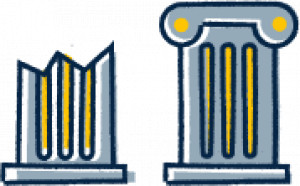You will visit the most famous monument of the country, the Acropolis. The magnitude and the rich heritage of Athens will be revealed to you, while exploring with your guide some of the key sites such as the Parthenon, and Erechtheion.
You will then extend your perspective of Ancient Athens by visiting the world renowned New Acropolis Museum.
You will also enjoy a vehicle tour, passing by more distant but equally important sites of the city, such as the Panathenaic Stadium, the site of the first modern Olympic Games in 1896. You will also admire the Presidential Palace, Zappeion, the Temple of Olympian Zeus, Hadrian’s Gate, the Tomb of the Unknown Soldier, Syntagma Square, the Catholic Cathedral, and the Athens Classical Trilogy.
Acropolis
Acropolis is the world famous ancient site of Athens, symbolizing democracy and regarded as the most important representation of ancient Greek civilization. High on its rocky outcrop, as its name akro polis (highest point of city) designates, it stands guard over the city. The monument of the Parthenon, visible from almost everywhere, and the other main buildings were built in the 5th century BC by the order of the general and statesman Pericles to commemorate the cultural and political achievements of the city of Athens. The site includes the Propylae, the imposing entrance to the site, the Parthenon, the Erechthion and the Temple of Athena Nike.
Parthenon
One of the most well-known monuments in the world and symbol of ancient Greece, the Parthenon was built between 447-432 BC as a dedication to the Goddess Athina. The shrine inside once housed a 12 meter high wooden statue of the goddess, adorned with ivory and gold. Designed by the sculptor Phidias and constructed by the architects Iktinos and Kallicrates, the marble temple consists of 46 outer and 19 inner tapered Doric columns, and contains no straight lines or angles, a feat of Greek architecture. During its long and varied history, it was alternatively used as a temple, treasury, church, mosque and a gunpowder storage facility.
Propylaea
The Propylaea was the monumental entrance to Acropolis, built between 437-432 BC by the architect Mnesicles. A steep inclining ramp lead up to the Propylaea which was comprised of a central building and two lateral wings. The north wing had wall paintings and was referred to as the Pinakotheke, while the smaller south wing lay adjacent to the Temple of Athina Nike. There were actually 5 entrances, 4 for pedestrians and a larger central one for vehicles. The coffered roof interior had designs in gold stars on a blue background. Over the centuries, the building served as a Byzantine bishop’s palace, a Florentine palazzo and a Turkish governor’s residence.
The Temple of Nike Athena
To the right of the Propylaea lies the Temple of the Victory of Athena, built around 420 BC by Kallikrates to commemorate the Athenians’ victory over the Persians. There was a wooden cult statue of the goddess who held a helmet in one hand (war) and a pomegranate branch (peace) in the other. The smallest temple of the Acropolis, Nike Athena is of the Ionic order and has 4 monolithic columns at both the front and rear but not at the sides. As with the other buildings at the site, it was converted into a church in 5th century AD, only to be totally dismantled in the 17th century by the Ottomans to build a fortification. After Greek Independence, it was restored, dismantled and rebuilt again.
The Erechthion
The temple was built between 421-406 BC by Mnesicles and Phidias, and was dedicated to the goddess Athena and the god Poseidon who both contested the city of Athens. It is the site of the ‘Sacred Tokens’ which were the marks made by Poseidon with his trident to bring up water and the olive tree of Athena, who finally won the coveted title. On the north side is the famous ‘Porch of the Maidens’ where the 6 figures of the Caryatides stood. The one was stolen by Lord Elgin and the other 5 have been replaced by replicas, with the originals moved to the Acropolis Museum. The Erechthion was also converted into a church, palace, harem and was bombed during the Greek War of Independence.
Panathenaic Stadium
The only stadium in the world built entirely of marble, the Panathenaic Stadium or Kallimarmaro as it is known, is one of the main historic attractions of Athens. Originally built in 330 BC to host the Panathenaic Games, a religious and athletic festival held every 4 years in honor of the goddess Athena, it was rebuilt in marble by Herodus Atticus in 144 AD and had a capacity of 50,000 seats. After the 4th century AD, it was largely abandoned until 1869 when it was excavated and hosted the Zappas Olympics in 1870 and 1875, and again the Olympic Games of 1896 and 2004. The Olympic flame travels from the ancient site of Olympia all over Greece before arriving at the Stadium for the official handover to the new Olympic host country. This is also the finishing point of the annual Athens Classic Marathon.
Tomb of the Unknown Soldier
The monument honoring Greek soldiers who died in battle was unveiled on March 25, 1932, and it is located in front of the Parliament on Syntagma Square. The sculpture, set in the center of a wall flanked by two staircases, shows a warrior lying on the ground, holding a shield in his hand and wearing a an Ancient Greek-style helmet. The position of the figure suggests he is living his last moments or is ready to rise at any moment. To the left and right of the sculpture are phrases from Thucydides, while above it one reads “ΕΙΣ ΑΦΑΝΗ ΣΤΡΑΤΙΩΤΗ”(To an Unknown Soldier.) Names of battles where Greeks lost their lives are written both around the sculpture and on the stairs on either side. An eternal flame burns in front and the tomb is guarded by the elite guard of Evzones.
Notes & Clarifications
- Prices vary according to group size
- Keep in mind that this is a private tour and it is possible to customize it to meet your desires. Should you want to change the itinerary please do not hesitate to contact us by sending us a request through the inquiry form
- Don’t forget to bring a water bottle and lots of energy!
What makes us different?
- We offer only private tours. No mixed groups
- We are absolutely flexible. Our tours can be customized to your wishes
- Special requests are always welcome. We love to tailor holidays
- All of our tours are designed and operated by our company
- Our state-licensed “Insider” guides are thoroughly selected and trained, each one of them expert in his field
- We always select the most suitable state-licensed “Insider” guide who matches your profile and interests
 Archeology
Archeology
 Architecture
Architecture